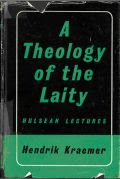…the laity, generally speaking, feels itself spiritually powerless and illiterate as to its witness in that sector, which is the very place where most of its life is spent. This is the appalling problem, hidden by the fact that this laity, impotent and paralysed in the most strategic region of their life, are often faithful worshippers and do all kinds of service in the ordinary run of church life. The problem is still more appalling because the relevancy of the Church, and what she represents in the modern world, is dependent on the conversion of this impotence and paralysis into a manifestation of power and spirit. (37-8)
 Sounds like an extract from an LICC publication? These words were written in 1958 by Hendrik Kraemer in his Theology of the Laity. I stumbled across this book while we were in the process of clearing the LICC library and began to flick through it. It only took a few glances to realise that Kraemer's words (sadly) remain as potent and relevant today as when they were first published. (For those interested, the book is still in print and available from Amazon)
Sounds like an extract from an LICC publication? These words were written in 1958 by Hendrik Kraemer in his Theology of the Laity. I stumbled across this book while we were in the process of clearing the LICC library and began to flick through it. It only took a few glances to realise that Kraemer's words (sadly) remain as potent and relevant today as when they were first published. (For those interested, the book is still in print and available from Amazon)



